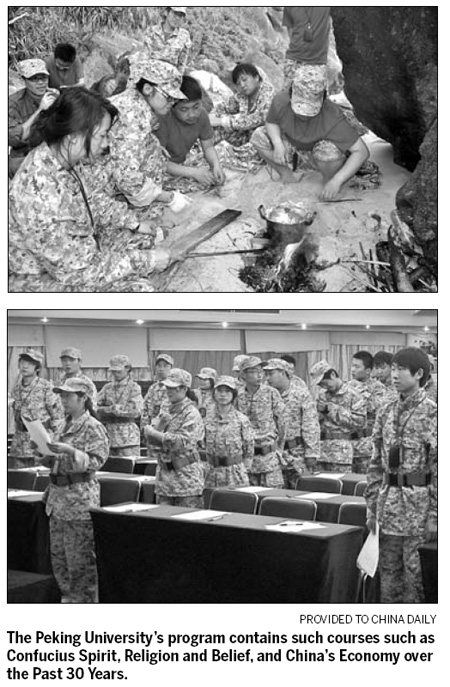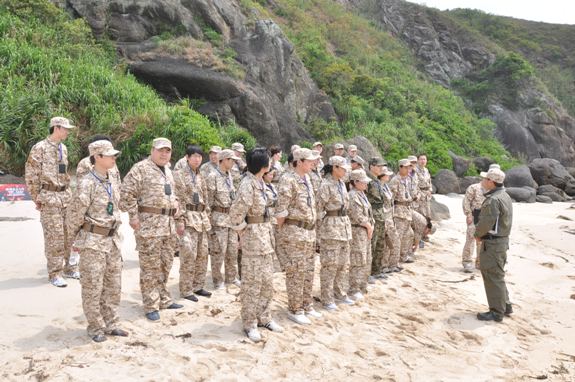Focus
Elite university offers courses in life for rich kids
By Wang Wei (China Daily)
Updated: 2010-05-06 08:03
 |
Large Medium Small |
|
Fifty offspring of some of China's wealthiest people enrolled in March 2009 in a training class at Peking University. The program, tailored for the children of the elites, are sent to a military camp on an uninhabited island in Shenzhen, Guangzhou province, learning to survive using natural means. Provided to China Daily |
Every two months, Lawrence drives his BMW 530 to Anhui airport, hops aboard a plane to Beijing and attends a training class at Peking University for the children of China's wealthiest.
The 21-year-old, surnamed Xu, who prefers to stay anonymous behind his English name, has been making the four-day trip since September to the elite university, despite only graduating with an English degree from Deakin University in Australia. He is qualified to attend because his father is a Chinese entrepreneur - another name for the extremely rich.
| ||||
"It presents me with a great opportunity to meet others with similar life patterns and learn practical managerial skills," he said.
According to the Hurun China Rich List, there are more than 825,000 people in China with a personal wealth of more than 10 million yuan, and 51,000 tycoons with at least 100 million yuan in the bank. How to make youngsters fill the shoes of their successful parents is the question on the lips of many resourceful universities.
Peking University and Tsinghua University in Beijing, as well as Fudan University in Shanghai, are just a few examples of those which have tapped the market by offering training classes to the sons and daughters of the rich.
The phenomenon first appeared in a university in Zhejiang province, an area where most of China's entrepreneurs originate. The number of such courses at famous universities has since climbed to roughly 10 across China, with tuition fees, for courses of varying length, ranging between 10,000 and 300,000 yuan.

The most expensive course is offered at Jinbailing Education, a consultancy in Wuxi city, Jiangsu province. The tuition fee is 668,000 yuan for a two-year program and covers a range of topics from accounting to golf. According to reports from Yangzi Evening News in April, at least 10 rich second-generation members have already applied.
Ma Ya, the organizer of the Peking University program, believes programs tailored to the children of entrepreneurs will continue to attract interest.
He told METRO that when the first program started in March 2009, it had 50 students. The number surpassed 100 for the second program and is expected to hit 200 for the third. Each new program lasts one year, with a four-day course held every two months.
 Ma said the program particularly focuses on residents from the north of China, such as Shanxi province and Inner Mongolia autonomous region, as well as other traditionally resource-rich cities where locals have become rich from coal. His applicants are normally between 22 and 35 years old. Ma added that male students account for 70 percent of all students and about half have studied overseas.
Ma said the program particularly focuses on residents from the north of China, such as Shanxi province and Inner Mongolia autonomous region, as well as other traditionally resource-rich cities where locals have become rich from coal. His applicants are normally between 22 and 35 years old. Ma added that male students account for 70 percent of all students and about half have studied overseas.
"Most participants are here because they were persuaded by parents who want them to carry on the family business," he said.
The Peking University curriculum contains such subjects as Confucius Spirit, Religion and Belief, and China's Economy over the Past 30 Years. It also includes military training, in which students are sent to an uninhabited island in Shenzhen, Guangzhou province, to survive using natural means.
Politicians, economists, chairmen of established companies and professors of history and economics will give lectures during the course, Ma said.
Ma believes the training courses are necessary because they help foster communication between students and their parents.
"These students often don't have a clear life objective and can't work independently when facing problems," he said. "They also face significant pressure from both their parents and society."
However, one training specialist believes classes like these are not effective in shaping an individual into a successful company leader.
Gu Laifeng, an expert of MBA studies, said the qualities of a composed company leader won't come from a training session. He believes they are cultivated by experiencing the hardships of establishing a business from scratch.
"Entrepreneurs should not expect their children to become the only inheritor of the business. It is too much pressure," he warned.










